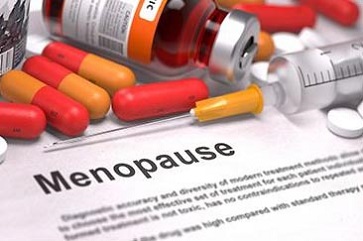Sebastian Lavoie Fact checked by:Thailand Medical News Team Sep 04, 2024 7 months, 3 weeks, 1 day, 8 hours, 39 minutes ago
Medical News: A new study sheds light on the complex relationship between medications used by postmenopausal women and the progression of SARS-CoV-2 infections. This
Medical News report focuses on the findings from a retrospective analysis conducted in the Veneto Region of Italy, which aimed to understand how different treatments for menopausal symptoms might influence COVID-19 outcomes in women over the age of 50.
 The impact of postmenopausal medications on COVID-19
The impact of postmenopausal medications on COVID-19
progression in women
The researchers involved in this study hail from a range of prestigious institutions, including the University of Padova, the Veneto Tumour Registry, Dompé Farmaceutici S.p.A., and the Institute of Oncology Research in Switzerland, among others.
Background: Hormones and COVID-19
From the onset of the COVID-19 pandemic, it has been evident that men and older adults are more susceptible to severe outcomes compared to women and younger individuals. Research suggests that sex hormones, particularly estrogen, play a role in modulating the immune response to SARS-CoV-2. Estrogen has been shown to downregulate lung inflammation and reduce cytokine release, which are crucial factors in the severity of COVID-19. This hormone's protective role in the immune system may partly explain why women generally fare better against the virus than men.
Selective estrogen receptor modulators (SERMs), commonly used in the treatment of breast cancer and osteoporosis, have also been noted for their potential to reduce the risk of viral infections, including SARS-CoV-2. These medications can selectively activate or block estrogen receptors in different tissues, contributing to their varied effects on the body. Previous studies have indicated that breast cancer patients undergoing SERM therapy experienced a lower prevalence of SARS-CoV-2 infections. This finding prompted further investigation into whether these drugs might offer similar protection in a broader population of postmenopausal women.
Study Overview
The retrospective analysis focused on a cohort of 124,393 women over the age of 50 residing in the Veneto Region, who were tested for SARS-CoV-2 between February and July 2020. The study aimed to assess the frequency and severity of COVID-19 in these women, particularly in relation to the medications they were taking for menopausal symptoms.
The medications analyzed included:
-Estrogen Modulators (EMs): Raloxifene and Bazedoxifene
-Estrogen and Progestin (EP) combinations
-Bisphosphonates (BIs)
-Cholecalciferol (Vitamin D3) and calcium (CC)
The researchers utilized data from the regional archive of COVID-19 swab tests, hospital admission records, and the regional drug prescriptions database to conduct their analysis. Women who had been diagnosed with cancer were excluded from the study to focus on non-oncological cases.
Key Findings
The study's findings offer valuable insights into t
he effects of different menopausal treatments on COVID-19 outcomes. Among the most significant results were:
-Vitamin D3 and Calcium Supplementation: Women who were treated with vitamin D3 alone or in combination with calcium showed a 26% reduction in their risk of SARS-CoV-2 infection. This is a notable finding, given the ongoing debate about the role of vitamin D in preventing COVID-19. However, it is important to note that these same women also exhibited an increased risk of hospitalization by 2.69 times compared to those not undergoing this treatment. This dual effect suggests that while vitamin D might help reduce infection rates, it could also be associated with more severe disease progression in those who do get infected.
-Estrogen and Progestin Therapies: Women receiving estrogen and progestin therapies did not show a statistically significant change in their risk of SARS-CoV-2 infection, hospitalization, or death compared to those not on these treatments. This finding suggests that these hormone therapies may not have a protective or harmful effect on COVID-19 outcomes.
-Estrogen Modulators: The study included a small number of women undergoing treatment with estrogen modulators (11 women), none of whom were infected with SARS-CoV-2. Although the sample size is too small to draw definitive conclusions, it suggests a potential protective role of SERMs against the virus, consistent with previous research.
-Other Comorbidities: The study also highlighted the impact of various comorbidities on COVID-19 outcomes. For example, women with neurologic, renal, rheumatologic, and respiratory conditions were found to be at higher risk of hospitalization and death. Age was also a significant factor, with older women facing a greater risk of severe outcomes.
Implications and Future Research
The findings from this retrospective analysis contribute to the ongoing discussion about the role of vitamin D and hormone therapies in managing COVID-19. The observed protective effect of vitamin D supplementation against infection is promising, but the associated increase in hospitalization risk warrants further investigation. It remains unclear whether this risk is directly related to the vitamin D treatment or if other factors are at play.
The potential role of SERMs in protecting against COVID-19, particularly in postmenopausal women, is another area that deserves further exploration. Although the current study's sample size for SERM-treated women was too small to draw firm conclusions, the absence of infections in this group is encouraging.
Conclusions
In conclusion, this study underscores the complexity of managing COVID-19 in postmenopausal women, particularly in relation to the medications they are taking for menopausal symptoms. While vitamin D3 and calcium supplementation may reduce the risk of infection, the associated increased risk of hospitalization highlights the need for caution and further research. Similarly, the potential protective effect of estrogen modulators against SARS-CoV-2 infection warrants additional study in larger cohorts.
The study findings were published in the peer-reviewed journal: Life.
https://www.mdpi.com/2075-1729/14/9/1107
For the latest COVID-19 News, keep on logging to Thailand
Medical News.
Read Also:
https://www.thailandmedical.news/news/persistent-endothelial-dysfunction-oxidative-stress-and-lipid-peroxidation-are-found-in-women-with-post-covid-19-health-issues
https://www.thailandmedical.news/news/covid-19-news-yet-another-case-report-showing-that-sars-cov-2-infections-can-cause-genital-ulcers-in-women
